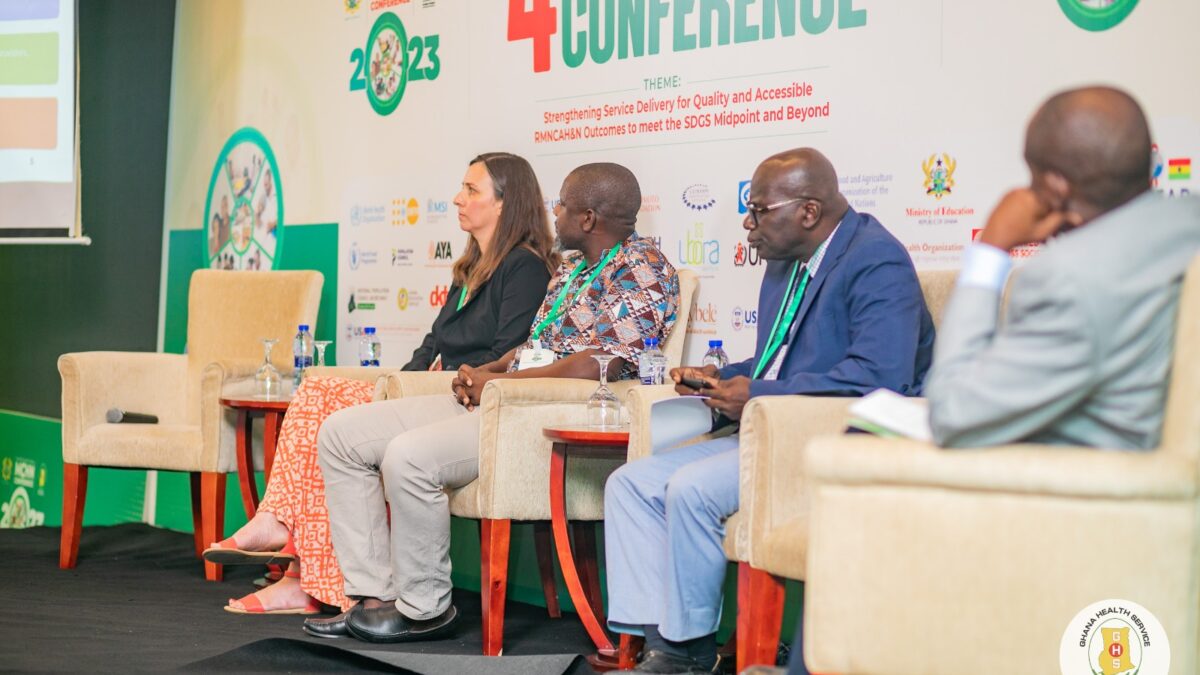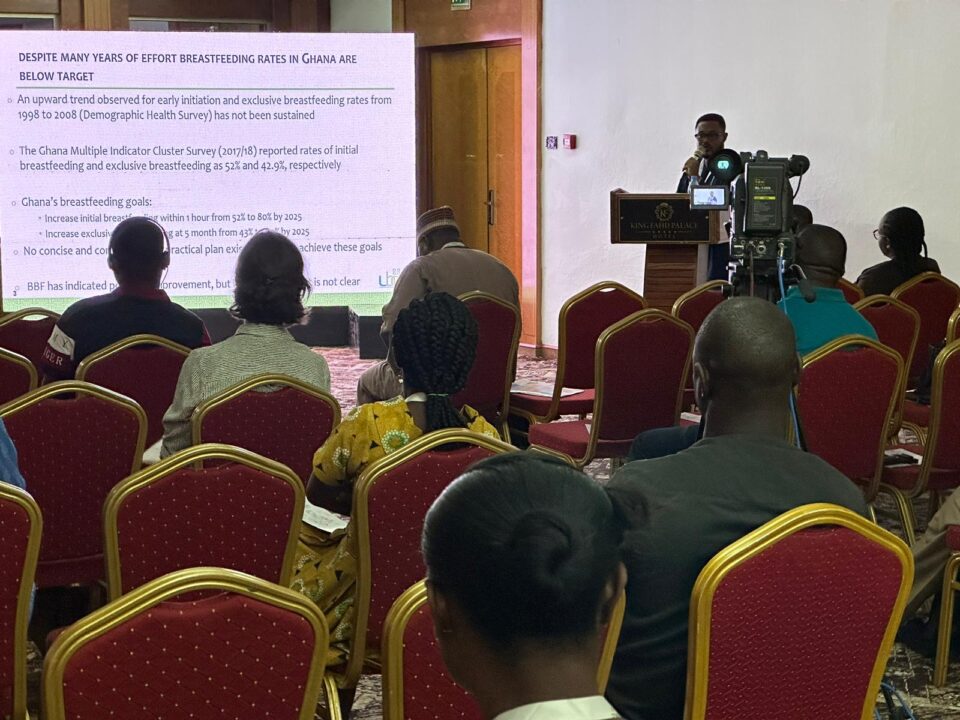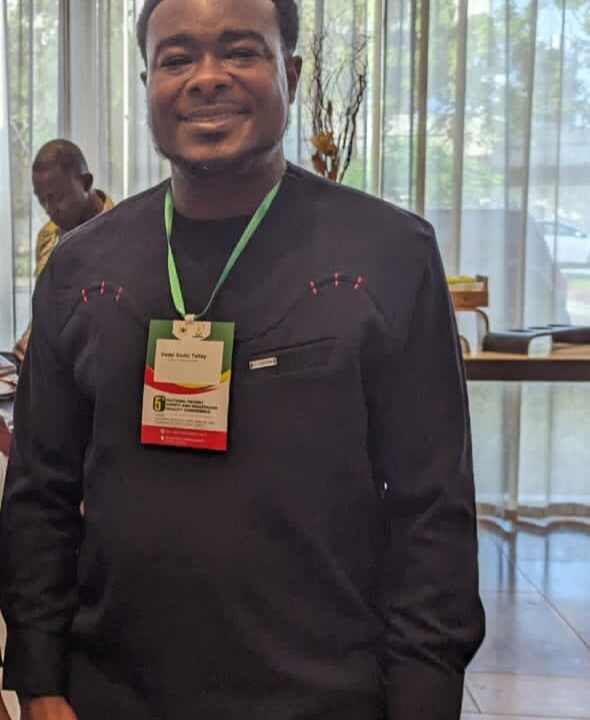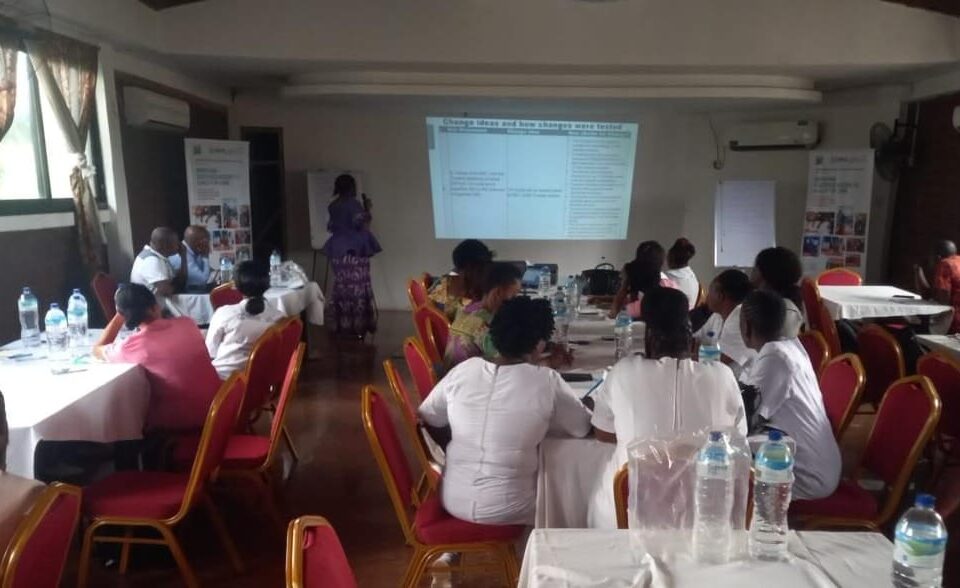Barriers to Breastfeeding, a Multifaceted Problem Which Requires Wider Stakeholder Engagement – Ubora Quality Institute Makes a Statement at the 4th MCHN Conference

GHS Marks World Patient Safety Day: Board Member of Ubora Institute Moderates Plenary Session
September 21, 2023Vacancies
October 25, 2023Ubora Institute participated in the 3-day 4th National Maternal, Child Health and Nutrition Conference 2023. The conference was under the theme “Strengthening Service Delivery for Quality and Accessible Reproductive, Maternal, Newborn, Child Health and Nutrition (RMNCH&N) Outcomes to meet the SDGs Midpoint and Beyond”. It is a platform that allows policymakers and experts to engage in discussions and knowledge sharing to address health and nutrition issues among mothers and children.
Ubora Institute's Lead Advisor on Breastfeeding and Nutrition for the Breastmilk for Life project (BFL), Philomina Amofah in her presentation on “Identifying Barriers and Drivers to Breastfeeding among Mothers in Ghana”, discussed the three categories of barriers - Technical knowledge gap, Physical burden, and Organizational challenges; drawn from the BFL Project data analysis.
She noted that, although the study presented mothers and their influencers with a knowledge of the benefits of breastfeeding, in the actual process of breastfeeding with success, this does not reflect well. The challenges with breastfeeding at initiation through to 6 months and 2 years of the child are real; a multifaceted problem which requires wide stakeholder engagement, as one of its strategies for success.
That notwithstanding, she added that information targeting mothers and close relations for addressing the identified challenges in breastfeeding practice, needs to consider the different socio-demographic groups in terms of packaging and medium of delivery. The BFL project is currently developing a strategy and a complimentary implementation plan, to reinforce drivers to breastfeeding and to address the identified barriers.
The Director-General of the Ghana Health Service, Dr Patrick Kumah Aboagye in his remarks said “We have always talked about where we are, but not so much of how we can get to the next level”, stressing that this MCHN2023 Conference is about how to achieve the set targets of the related Sustainable Development Goals.
It was refreshing to hear Dr Anarfi Asamoah Baah, a representative from the office of the President, reiterate the inclusion of Family Planning in the NHIS benefit package and how it links to accelerating the achievement of the related SDG targets. This, according to him, is a good thing because Ghana has been stagnant when it comes to family planning.
Additionally, the Government Statistician, Prof. Samuel Kobina Annim in a plenary session stressed the importance of the use of data in making informed projections and policy decisions to attain the SDGs by 2030. He also urged researchers to make use of available data to inform policy and interventions for the desired outcome of projects.
The conference focused on enhancing health outcomes by strategically utilizing science research, innovation, data, digital technologies, artificial intelligence, and collaborative partnerships. Present at the conference were international partners, civil society organizations, the Nursing and Midwifery Council of Ghana, policymakers, experts, the National Development Planning Commission, the Food and Drugs Authority, and Academia among others.
Ubora Institute's Lead Advisor on Breastfeeding and Nutrition for the Breastmilk for Life project (BFL), Philomina Amofah in her presentation on “Identifying Barriers and Drivers to Breastfeeding among Mothers in Ghana”, discussed the three categories of barriers - Technical knowledge gap, Physical burden, and Organizational challenges; drawn from the BFL Project data analysis.
She noted that, although the study presented mothers and their influencers with a knowledge of the benefits of breastfeeding, in the actual process of breastfeeding with success, this does not reflect well. The challenges with breastfeeding at initiation through to 6 months and 2 years of the child are real; a multifaceted problem which requires wide stakeholder engagement, as one of its strategies for success.
That notwithstanding, she added that information targeting mothers and close relations for addressing the identified challenges in breastfeeding practice, needs to consider the different socio-demographic groups in terms of packaging and medium of delivery. The BFL project is currently developing a strategy and a complimentary implementation plan, to reinforce drivers to breastfeeding and to address the identified barriers.
The Director-General of the Ghana Health Service, Dr Patrick Kumah Aboagye in his remarks said “We have always talked about where we are, but not so much of how we can get to the next level”, stressing that this MCHN2023 Conference is about how to achieve the set targets of the related Sustainable Development Goals.
It was refreshing to hear Dr Anarfi Asamoah Baah, a representative from the office of the President, reiterate the inclusion of Family Planning in the NHIS benefit package and how it links to accelerating the achievement of the related SDG targets. This, according to him, is a good thing because Ghana has been stagnant when it comes to family planning.
Additionally, the Government Statistician, Prof. Samuel Kobina Annim in a plenary session stressed the importance of the use of data in making informed projections and policy decisions to attain the SDGs by 2030. He also urged researchers to make use of available data to inform policy and interventions for the desired outcome of projects.
The conference focused on enhancing health outcomes by strategically utilizing science research, innovation, data, digital technologies, artificial intelligence, and collaborative partnerships. Present at the conference were international partners, civil society organizations, the Nursing and Midwifery Council of Ghana, policymakers, experts, the National Development Planning Commission, the Food and Drugs Authority, and Academia among others.
Related posts
November 27, 2023
September 21, 2023




